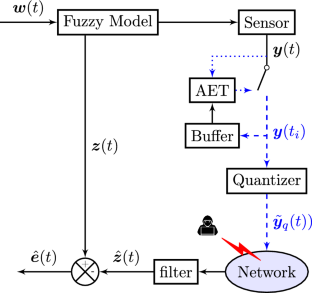International Journal of Fuzzy Systems ( IF 4.3 ) Pub Date : 2024-04-08 , DOI: 10.1007/s40815-024-01711-5 Mourad Kchaou , Obaid Alshammari , Houssem Jerbi , Rabeh Abassi , Sondess Ben Aoun

|
This paper examines the event-triggered filtering problem related to discrete-time nonlinear systems that are described by interval type-2 (IT2) fuzzy models. The filter being studied is prone to a non-stationary Markovian process when both quantization output and deception attack are taken into account simultaneously. It is proposed to implement an asynchronous IT2 fuzzy filter characterized by two different piecewise-stationary Markov chains specifying the deception attacks and the modes of the system. A new event-triggering protocol (ETP) is investigated as a means of reducing unnecessary signal transmissions on the communication channel. Based on the linear matrix inequality analysis and using the information on upper and lower membership functions, it is demonstrated that stochastic sufficient conditions exist for the desired filter such that it exhibits mean square stability and achieves the prescribed mixed \(H_\infty \) and passivity performance index. Moreover, an optimization-based problem for computing filter gains is proposed. An experimental numerical illustration based on a truck-trailer system is used to validate the developed scheme.
中文翻译:

具有量化和欺骗攻击的模糊马尔可夫切换系统的自适应事件触发滤波:一种非平稳方法
本文研究了与由区间类型 2 (IT2) 模糊模型描述的离散时间非线性系统相关的事件触发滤波问题。当同时考虑量化输出和欺骗攻击时,所研究的滤波器容易出现非平稳马尔可夫过程。建议实现一个异步 IT2 模糊滤波器,其特征是两个不同的分段平稳马尔可夫链,指定欺骗攻击和系统模式。研究了一种新的事件触发协议(ETP),作为减少通信通道上不必要的信号传输的方法。基于线性矩阵不等式分析并利用上下隶属函数的信息,证明了所需滤波器存在随机充分条件,使其表现出均方稳定性并达到规定的混合\(H_\infty \)和无源性能指标。此外,提出了计算滤波器增益的基于优化的问题。基于卡车拖车系统的实验数值说明用于验证所开发的方案。



























 京公网安备 11010802027423号
京公网安备 11010802027423号